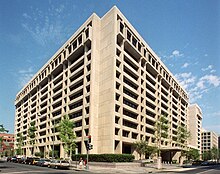
Back Internasionale Monetêre Fonds AF Internationaler Währungsfonds ALS አለም አቀፍ ገንዘባዊ መዝገብ AM Fundo Monetario Internacional AN صندوق النقد الدولي Arabic صندوق النقد الدولي ARY صندوق الفلوس الدولى ARZ আন্তঃৰাষ্ট্ৰীয় মুদ্ৰা নিধি AS Fondu Monetariu Internacional AST Халкъаздагьоркьосеб валюталъул фонд AV
 The Seal of the International Monetary Fund | |
 Headquarters in Washington, D.C. | |
| Abbreviation | IMF |
|---|---|
| Formation | 1 July 1944 |
| Type | International financial institution |
| Purpose | Promote international monetary co-operation, facilitate international trade, foster sustainable economic growth, make resources available to members experiencing balance of payments difficulties, prevent and assist with recovery from international financial crises[1] |
| Headquarters | 700 19th Street NW, Washington, D.C., U.S. |
| Coordinates | 38°53′56″N 77°2′39″W / 38.89889°N 77.04417°W |
Region | Worldwide |
| Membership | 191 countries (190 UN countries and Kosovo)[2] |
Official language | English[3] |
Managing Director | Kristalina Georgieva |
First Deputy Managing Director | Gita Gopinath[4] |
Chief Economist | Pierre-Olivier Gourinchas[5] |
Main organ | Board of Governors |
Parent organization | United Nations[6][7] |
| Budget | $1,295 million[8]: 60 (2023) |
| Staff | 3,100[1] |
| Website | imf.org |
The International Monetary Fund (IMF) is a major financial agency of the United Nations, and an international financial institution funded by 191 member countries, with headquarters in Washington, D.C. It is regarded as the global lender of last resort to national governments, and a leading supporter of exchange-rate stability. Its stated mission is "working to foster global monetary cooperation, secure financial stability, facilitate international trade, promote high employment and sustainable economic growth, and reduce poverty around the world."[1][9]
Established in July of 1944[10] at the Bretton Woods Conference, primarily according to the ideas of Harry Dexter White and John Maynard Keynes, it started with 29 member countries and the goal of reconstructing the international monetary system after World War II. In its early years, the IMF primarily focused on facilitating fixed exchange rates across the developed world.[11] It now plays a central role in the management of balance of payments difficulties and international financial crises.[12][11] Through a quota system, countries contribute funds to a pool from which countries can borrow if they experience balance of payments problems. The IMF works to stabilize and foster the economies of its member countries by its use of the fund, as well as other activities such as gathering and analyzing economic statistics and surveillance of its members' economies.[13][14]
The current managing director (MD) and chairperson of the IMF is Bulgarian economist Kristalina Georgieva, who has held the post since 1 October 2019.[15] Indian-American economist Gita Gopinath, previously the chief economist, was appointed as first deputy managing director, effective 21 January 2022.[16] Pierre-Olivier Gourinchas was appointed chief economist on 24 January 2022.[17]
- ^ a b c "About the IMF". International Monetary Fund. Archived from the original on 16 October 2012. Retrieved 14 October 2012.
- ^ "IMF Members' Quotas and Voting Power, and IMF Board of Governors". International Monetary Fund. 17 October 2020. Archived from the original on 8 June 2017. Retrieved 23 October 2024.
- ^ Boughton 2001, p. 7 n.5.
- ^ "First Deputy Managing Director Geoffrey Okamoto to Leave IMF, Gita Gopinath to Be IMF's New First Deputy Managing Director". International Monetary Fund. Archived from the original on 11 April 2022. Retrieved 28 January 2022.
- ^ "IMF Managing Director Names Pierre-Olivier Gourinchas as IMF Economic Counsellor and Head of Research Department". International Monetary Fund. Archived from the original on 11 April 2022. Retrieved 28 January 2022.
- ^ "Factsheet: The IMF and the World Bank". International Monetary Fund. 21 September 2015. Archived from the original on 3 June 2004. Retrieved 1 December 2015.
- ^ "About the IMF Overview". International Monetary Fund. Archived from the original on 8 September 2020. Retrieved 1 August 2017.
- ^ "Download the full report | IMF Annual Report 2023". www.imf.org. Archived from the original on 21 April 2024. Retrieved 21 April 2024.
- ^ "Articles of Agreement, International Monetary Fund" (PDF). International Monetary Fund. 2011. Archived (PDF) from the original on 4 November 2011.
- ^ "About the IMF". International Monetary Fund. Archived from the original on 26 June 2022. Retrieved 8 October 2024.
- ^ a b Vreeland, James Raymond (2019). "Corrupting International Organizations". Annual Review of Political Science. 22 (1): 205–222. doi:10.1146/annurev-polisci-050317-071031. ISSN 1094-2939.
- ^ Lipscy, Phillip Y. (2015). "Explaining Institutional Change: Policy Areas, Outside Options, and the Bretton Woods Institutions". American Journal of Political Science. 59 (2): 341–356. doi:10.1111/ajps.12130.
- ^ Schlefer, Jonathan (10 April 2012). "There is No Invisible Hand". Harvard Business Review. Harvard Business Publishing. Archived from the original on 7 August 2023. Retrieved 15 March 2016 – via hbr.org.
- ^ Escobar, Arturo (1980). "Power and Visibility: Development and the Invention and Management of the Third World". Cultural Anthropology. 3 (4): 428–443. doi:10.1525/can.1988.3.4.02a00060.
- ^ Crutsinger, Martin (25 September 2019). "Economist who grew up in communist Bulgaria is new IMF chief". Associated Press. Archived from the original on 21 April 2022. Retrieved 18 June 2020.
- ^ "First Deputy Managing Director Geoffrey Okamoto to Leave IMF, Gita Gopinath to Be IMF's New First Deputy Managing Director". International Monetary Fund. Archived from the original on 11 April 2022. Retrieved 4 February 2022.
- ^ "IMF Managing Director Names Pierre-Olivier Gourinchas as IMF Economic Counsellor and Head of Research Department". International Monetary Fund. Archived from the original on 11 April 2022. Retrieved 4 February 2022.